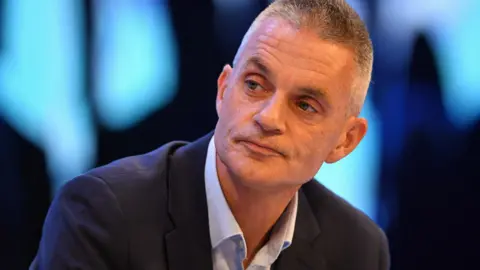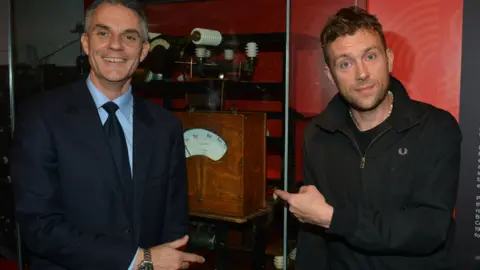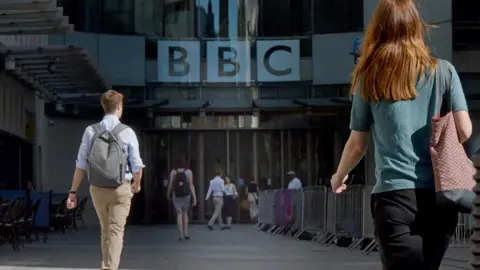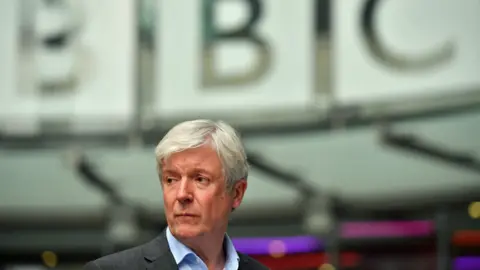Tim Davie's hellish new job as BBC director general

 Getty Images
Getty ImagesTim Davie formally takes over as the BBC's director general on Tuesday. He replaces Lord Hall, who has stepped down after seven years in the role. BBC media editor Amol Rajan looks ahead to the challenges Mr Davie will face.
The BBC's new director general is a global deal-maker facing a daunting set of challenges. Alas for him, many of the forces that will determine his legacy are beyond his control.
Tim Davie has landed one of the most privileged jobs in Britain and global media, leading thousands of creative people at a remarkable moment in history.
Aside from that, it's hell.
Always the front-runner, he has taken a significant pay cut to have the fight of his life. In this blog, based on recent conversations with over a dozen senior figures in the media industry within the BBC and beyond, I will give a summary of just some of the challenges he faces.
Before that, a few words on him, his credentials, and - crucially - the forces beyond his control.
Davie is a commercial creature with a genuinely global perspective. A detailed analysis of recent BBC annual reports will show he was an effective revenue raiser at BBC Studios, the commercial wing of the BBC. Its job is to make deals with distributors.
Davie is becoming director general (DG) after several years of deal-making around the world. Making a deal with No 10 is now his most important task.
And this commercial and global experience is in marked contrast to the three most recent director generals, much of whose relevant experience at the BBC was in the News division. Davie does have experience of editorial leadership, from his time running the Audio and Music services.
Talking of which, several former BBC executives championed Davie because of the commitment to collective responsibility he showed when the decision was made to scrap BBC 6 Music in 2010. I am told he was privately against the decision, but fronted it publicly, taking a lot of heat for a move he disagreed with. The decision was eventually reversed by then-DG Mark Thompson.

Similarly, when the BBC was in a deep crisis after the departure of George Entwistle in 2012, as acting DG, Davie walked the newsroom floor and showed visible leadership. Staff I have spoken to on the shop floor today appreciated that.
He is a sports nut with three children. He runs marathons, supports Crystal Palace, and has more than once answered the phone with "I'm just listening to the football, what's happening?" He also has a cultural hinterland, having been chairman of Comic Relief and the Creative Industries Council, and on the board of the Tate.
He was the first in his family to go to university, and earned a scholarship to Whitgift School in Croydon. Aside from turning down the chance to run the Premier League, he has been approached in recent years by tech companies who wanted to poach him.
A common mistake in appreciations of any institutional leaders' legacy is to condemn them for failing to defeat forces that were in fact beyond their control. Most DGs' legacies and reputations are dominated by how they responded to challenges they couldn't possibly have foreseen when they got the job. These might include an error broadcast at 6.07am on the Today programme, a prank call made by a famous presenter, or revelations around the sordid history of someone like Jimmy Savile.

It's important at an early stage to be clear about what Tim Davie can't control. He can't control the fact that the BBC no longer has anything like a dominant position in entertainment or sport. He can't control the fact that the most powerful companies in human history are competing with the BBC for eyeballs and attention. He can't control the fact that young people will increasingly be tempted to spend time with the products of those companies.
He can't control the fact that upholding levels of trust and a reputation for impartiality earned over a century is much, much harder in the age of social media. He can't control the fact that lies and conspiracy theories about him and the BBC will circulate every minute on social media. Greg Dyke had to worry about a lot, including what happened at 6.07am on the Today programme, but he didn't have to worry about that.
Effective leadership recognises the limits of power. It also recognises the vitality of key relationships. Davie can't control the most important appointment of his tenure, which is the likely replacement of Sir David Clementi as BBC chairman next February. His successor will be chosen by the government.
In idle moments I have wondered - because that's what media editors do - if one name that No 10 might consider is David Cameron. I have no evidence of any interest he may have in the role, or any discussion of it. It's just a thought.
Recent chairmen of the BBC, from Chris Patten to Christopher Bland, have been associated with Conservative circles. Cameron's only job outside politics was working for Michael Green of Carlton, a television firm. The BBC is one expression of the Big Society. And the biggest challenge facing Davie is his coming political negotiation with a No 10 operation that, before the pandemic, told Tim Shipman of The Sunday Times it would "whack" the BBC. The headline on that article was "No 10 tells BBC licence fee will be scrapped". So decent connections to the current government may prove handy.
Then again, Cameron did once call Dominic Cummings "a career psychopath".
Aside from all the forces, and appointments, beyond his control, Davie's inbox is daunting. Here are just some of the challenges he will confront.
Negotiations with No 10
Davie, who was a minor local Conservative official in the 1990s, hasn't been active in politics for over two decades. He's about to become very active. In 2022, when the BBC celebrates its centenary, he will lead a negotiation with No 10 over the licence fee from 2027. This will be nasty, brutish and long.
Often it will be played out in public. Davie needs to be prepared to resign - as Mark Thompson once threatened to - if he thinks the BBC is getting a bad deal. A threat of resignation will be ineffective unless he is prepared to follow it through. At just 53, and having by then a couple of years under his belt in the job, he knows that if he did leave he could get a job elsewhere fast (and almost certainly better paid).
Funding
How should the BBC be funded in the year 2027?
This is a very complex question with moral, technical and political elements. Presumably his stance in negotiations with No 10 will be to ask just how ambitious the government wants to be for the BBC. A persuasive argument might run something like this:
This is the Asian Century. Britain is (and you can be subtle about this point) a declining power, in relative terms at least. What have you/we got that allows us to punch above our weight? Answer (aside from our universities, scientists, etc) - the English language, great heritage brands, and phenomenally talented and creative people. Which institution best aligns those? The BBC. So unleash us, prime minister, to be a global force, not just in the market, but with the unique contract with the public which the licence fee represents.
But that's where it gets complicated. To turn the BBC from a £5bn organisation into one that can compete with Disney, Netflix, Apple and Amazon means raising money. That means commercial activity. But each commercial salvo made by the BBC has an impact on rivals who don't have recourse to the licence fee. This prompts them to lobby government, and often shapes regulation.
The other issue is that the BBC currently benefits from huge economies of scale. Move to a different model, including with a direct-to-consumer offer to international audiences, and some of those efficiencies can be lost.
Davie knows there are two trend lines that are hurting the corporation. The first is the cost of making programming around the world, which is hyper-inflationary. To cap the BBC's income is to make it, in relative terms, smaller and smaller in this new landscape.
The second trend line is the diminishing attachment of young audiences to BBC content. This can't be helped. Blame the internet. But income from young people, as licence fee payers, is vital; and if they disappear, then so too do the BBC's claims to universality, of giving something to everyone. This is the argument against a subscription model, which by definition caters to subscribers.
How, then, should the BBC be funded in 2027, to compete with tech giants and persuade young people to part with cash? Davie needs a very strong answer.
Programming
Ultimately, the BBC is judged on the quality of its output. This requires hiring the best and most creative people in the world (the terrible industry phrase for this, "talent", overlooks the importance of people who aren't on air).
Making great programmes that cut through in a golden age of audio and television is very hard. Especially when other people come along and poach your best people. Phoebe Waller-Bridge is one of the most exciting actors and writers in the world today. Her breakthrough shows were on the BBC. She might spend the bulk of her career at the BBC. But right now, Amazon has bought her time.
The promise of being on the BBC, with its prestige and big audiences, is valuable; but rivals are energised, and there's nothing Davie can do about that.
 AFP
AFPTrust
The coronavirus pandemic has shown demand for the BBC's news operation remains huge. That is partly a verdict on public interest in the story; but it's also a verdict on what BBC News staff have done day in, day out for years.
Nevertheless, trust, like all social goods, is easily destroyed, and not easily generated. For BBC News, impartiality and accuracy are the two keys. Both are much harder in the age of social media. Richard Sambrook, a respected former BBC executive now at Cardiff University, is conducting a review of how social media is affecting the impartiality of the BBC. That may have value, but the much, much bigger issue is the effect social media is having on accuracy.
In journalism, accuracy is foundational and sacred. Without accuracy, debates about impartiality are otiose. Under the current royal charter, the DG is both chief executive and editor-in-chief. Dauntingly for him, Davie is now responsible for the accuracy of all BBC output.
Culture and people
The BBC needs to reflect Britain as best as possible. That means cognitive diversity as much as other, more often discussed types of diversity. Tim Davie is privately educated (albeit on a scholarship), an Oxbridge arts graduate, and lives in the south-east.
He has led many of the BBC's efforts to improve its ethnic minority diversity. He will inherit from Tony Hall a pay structure reformed in the aftermath of the outcry over equal pay. The BBC has made progress on the gender pay gap across the organisation. Many outstanding cases of equal pay for equal work need to be resolved, and could yet generate damaging headlines.
But there's more to diversity than immediately visible classifications. Four urgent areas that need attention are the number of non-metropolitan staff (those who live in rural communities or small towns); the number of non-graduates; the proportion of staff who are from a science background rather than the arts and humanities; and the domination of London.
On the first of these, Davie has the advantage of being proudly suburban. On the last, Lord Hall has made significant progress in boosting BBC operations in Salford, Glasgow and elsewhere. On all of them, Davie has a solution readily available: the deeply rooted network of local staff around the country who are plugged into their communities, and look and sound like them. Massively ramping up the flow of producers and editors from local BBC services to the national headquarters is an easy potential win.
Many big executive jobs at the BBC are an invitation to hell, granted with all good wishes from the staff and public. Tony Hall had the hardest job of any DG in the BBC's history. Tim Davie's will be much harder.
Welcome, boss.
If you're interested in issues such as these, please follow me on Twitter or Facebook; and also please subscribe to The Media Show podcast from Radio 4.
